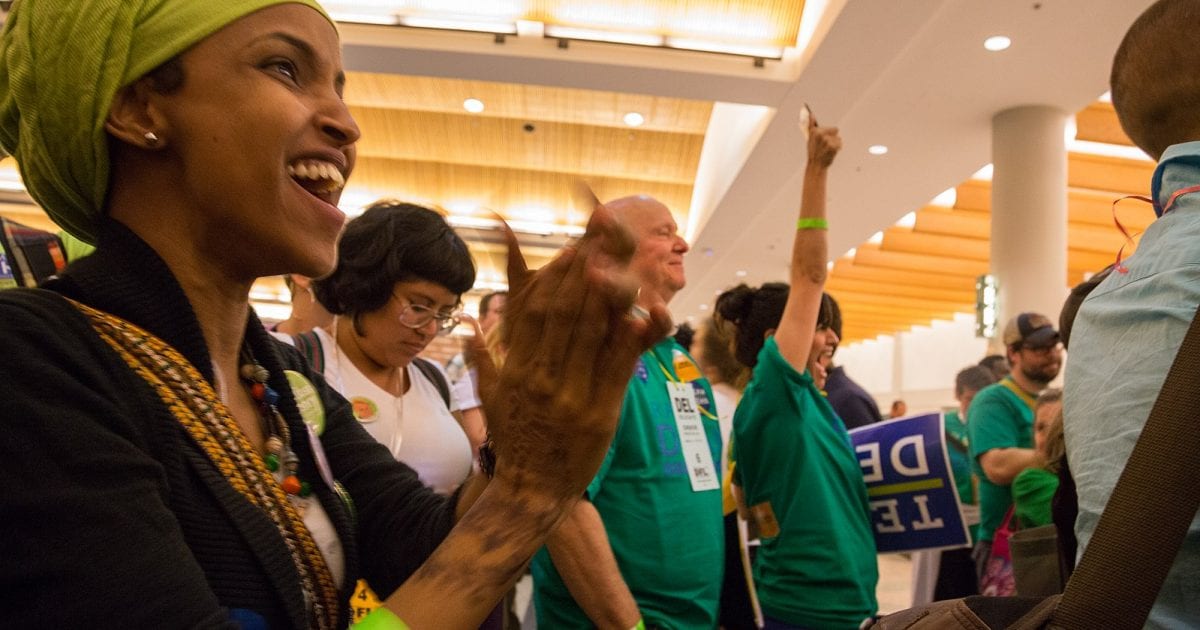Rep. Ilhan Omar has had quite the raucus 30 day period.
First she made several anti-Semitic comments about Israel.
Then she’s been in a dispute with her own party over the backlash, leading many to say Nancy Pelosi has lost control of the House, and also leading to an official House Resolution condemning anti-Semitism.
But now she may have just sealed her fate with her latest attackee: former President Obama.
In a new Politico piece, she is quoted as saying Obama was just as bad as Trump, just more polished…and “We don’t want anybody to get away with murder because they are polished.”
Wow, is there anyone she DOES like?
Take a look:
Here's more, from Politico:
Having fled the civil war in her native Somalia at age 8, spending the next four years in a Kenyan refugee camp before finding asylum in America, her adolescence was spent questioning why the land of opportunity she had read so much about—her new home, the United States—was falling short of its promise. Landing briefly in the suburbs of Washington, D.C., and then in Minneapolis, she saw dire poverty. She saw broken schools. She saw people without health care. Naturalized at age 17, she set off for college in North Dakota, studying political science and beginning her journey as a community activist focused on nutrition and education. She knocked on doors and startled many a rural, white woman with her headscarf, only to form deep bonds over their shared anxieties, such as “having affordable child care, making it work with school, holding down a job, and making it home in enough time to make dinner.”
As the Somali population in her city continued to swell, so did the young activist’s discontent. By the time she ran for office in 2016, knocking off a 22-term incumbent to win a seat in the Minnesota statehouse, Omar was fed up—not so much with Trumpism, or with politics in general, as with the Democratic Party.
As she saw it, the party ostensibly committed to progressive values had become complicit in perpetuating the status quo. Omar says the “hope and change” offered by Barack Obama was a mirage. Recalling the “caging of kids” at the U.S.-Mexico border and the “droning of countries around the world” on Obama’s watch, she argues that the Democratic president operated within the same fundamentally broken framework as his Republican successor.
“We can’t be only upset with Trump. … His policies are bad, but many of the people who came before him also had really bad policies. They just were more polished than he was,” Omar says. “And that’s not what we should be looking for anymore. We don’t want anybody to get away with murder because they are polished. We want to recognize the actual policies that are behind the pretty face and the smile.”
Omar embraces the comparisons between the Squad and the Tea Party. Despite the obvious philosophical differences, the models are strikingly similar: a two-term president leaves office with unfulfilled promises to the ideological core of his party’s base; that core base is galvanized by the election of the other party’s president; two years later, in that president’s first midterm election, the energy of that core base helps the out-of-power party retake control of Congress.
What remains to be seen is whether Democrats follow the comparison to its natural conclusion, with the insurgent activist wing swallowing up the party’s establishment. It’s a thought that paralyzes lawmakers like Phillips—and animates those like Omar. “We look at the negative aspects of the Tea Party and not really at the part of them that spoke to the American people, that made them feel like there were people actively fighting for them,” she says. “There’s a resemblance there. A lot of us are not that much different in our eagerness to want to come here and fight for our constituents, fight for the American ideals we believe in.”
The problem as Omar sees it—and not coincidentally, as some Tea Party conservatives saw it back in 2011—is that many of her fellow freshmen didn’t come to Washington to fight.
“I don’t believe that tiptoeing is the way to win the hearts and the minds of the people,” she says. “I get saddened by some of my freshman colleagues who can’t understand that within their districts the idea of Medicare for All is extremely popular. The Green New Deal is a very popular idea in their districts. Making sure that we have a final fix to our broken immigration system is very popular in their districts. What they pay attention to is the rhetoric that says, ‘This is a red-to-blue district, you have to be careful, you can’t talk about these policies.’ Well, in reality, these people are like everyone else: They struggle with the cost of health care, they struggle with our broken infrastructure, they struggle with having an economy that brings them into the 21st century. And we have to be willing to have those conversations.”




Join the conversation!
Please share your thoughts about this article below. We value your opinions, and would love to see you add to the discussion!